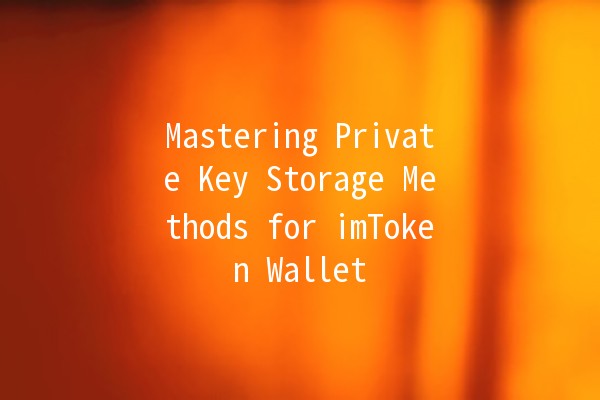When it comes to managing your digital assets securely in cryptocurrency wallets, understanding the importance of private key storage is paramount. imToken, one of the leading mobile wallets for Ethereum and ERC20 tokens, offers various options for private key management. This article will explore these storage methods in depth and provide practical tips to help you enhance your security practices while using imToken.
What is a Private Key?
At the most basic level, a private key is a long string of characters that provides access to your cryptocurrency wallet. Think of it as the password to your bank account. If someone possesses your private key, they can access your funds without any restrictions, making it crucial to store it securely.

Proper private key management is crucial because it determines the security of your digital assets. If your private key is lost or compromised, you risk losing access to your funds permanently. Therefore, understanding the various storage options and best practices is essential.
Cloud storage solutions offer convenience by allowing you to access your private keys from various devices. This method is suitable for users who need flexibility but comes with risks.
Pros: Easy access, sync across devices, and backup capabilities.
Cons: Vulnerability to attacks if the cloud service is compromised.
Ensure that you enable twofactor authentication (2FA) on your cloud account and regularly change your passwords to enhance security.
For those seeking enhanced security, integrating a hardware wallet with your imToken wallet is a viable option. Hardware wallets are physical devices that store private keys offline.
Pros: High security, protection against malware, and offline nature reduces hacking risks.
Cons: Higher initial investment and the requirement to manage the hardware device.
Choose reputable hardware wallets like Ledger or Trezor, and always keep the firmware updated to strengthen your security layer.
Creating a paper wallet is a method where the private key is generated and printed out, ensuring it remains offline.
Pros: Completely offline and immune to digital threats.
Cons: Can be easily lost or damaged, which may lead to permanent loss of access to funds.
When creating a paper wallet, ensure that the printing is done securely, preferably using a printer that is not connected to the internet.
imToken provides an option to store private keys securely within the app. This method is suitable for everyday transactions and quick access.
Pros: Convenient for frequent users and provides basic security features.
Cons: Vulnerable to malware if the device is compromised.
Use device security measures, such as biometric locks or strong passwords, to protect your mobile device.
Multisignature (multisig) wallets require more than one private key to authorize a transaction, adding an extra layer of security.
Pros: Increased security, better protection against loss or theft.
Cons: More complex setup and may require trusted collaborators.
Use multisig wallets for holding significant amounts of cryptocurrency or for collaborative accounts to ensure collective security.
To further enhance your private key storage practices, consider implementing the following techniques:
Losing your private key can result in the permanent loss of access to your cryptocurrencies. Unlike traditional banks, there are no recovery options available.
While cloud storage offers convenience, it also poses risks. Ensure to enable 2FA and use a strong password to mitigate security threats.
Hardware wallets store private keys offline, making them less susceptible to hacks and malware attacks.
Paper wallets can be very secure if created correctly but are vulnerable to physical damage and loss. Always store them in a safe place.
Multisignature wallets require multiple private keys to authorize a transaction, significantly increasing security, particularly for shared accounts or large holdings.
Changing your passwords regularly can help prevent unauthorized access. Aim to change them every 36 months or immediately if you suspect a breach.
By understanding the methods available for private key storage and their respective advantages and disadvantages, as well as implementing practical tips to enhance your security, you can confidently manage your digital assets within your imToken wallet. Remember, the key to it all is ensuring rigorous security practices to keep your investments safe in this digital age.